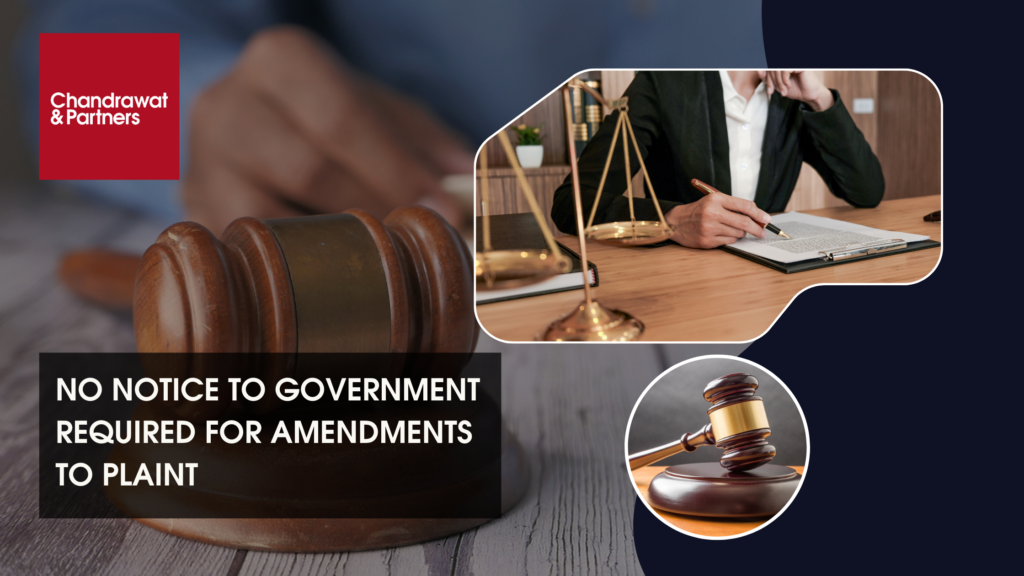Home > Recent Judgements > No Notice To Government Required For Amendments To Plaint
Jan 13, 2025
INTRODUCTION
In the case between The State of West Bengal & Ors. versus Pam Developments Private Limited & Anr., Supreme Court of India has ruled that when seeking to amend a plaint based on subsequent developments that are connected to the original cause of action, no prior notice under Section 80 of the Code of Civil Procedure (“CPC”) is required. The Court reasoned that such amendments relate to ongoing facts that are inherently linked to the initial cause of action, making it a continuous matter rather than a separate one requiring fresh notice.
The Supreme Court addressed a case which was debarred from participating in a road construction project by the appellant. The company filed a legal challenge against the debarment orders, contending they were illegal. Subsequently, the company sought to modify its original complaint to incorporate additional claims for financial damages resulting from multiple debarment orders. The central question before the Supreme Court was whether the company was required to serve a fresh notice to the government under Section 80 of the Civil Procedure Code before seeking to amend its complaint.
Under Section 80 of the CPC, parties must provide the government or its officials with two months’ advance notice before filing a lawsuit. This requirement is designed to allow the government time to resolve the dispute before court proceedings commence. In this case, however, the proposed amendment to the lawsuit pertained to additional debarment orders issued by the government after the initial lawsuit was filed, which were directly linked to the original debarment order being challenged.
KEY ISSUES
- Whether the amendment to the plaint incorporating subsequent facts and claims for financial losses changes the nature and character of the original civil suit?
- Whether the High Court’s decision to dispense with the requirement of formal notice under Section 80 CPC was justified considering the continuous nature of the cause of action?
JUDGMENT
The Supreme Court emphasized that when a proposed amendment to a lawsuit stems from subsequent developments that are fundamentally connected to the original cause of action, it falls under the concept of continuous cause of action. This legal principle recognizes that when a wrongful act continues or recurs over time, it extends the timeframe within which claims can be filed.
In their judgment, that the amendment did not fundamentally change the nature of their original lawsuit. The Court reasoned that since the amendment merely sought to include additional facts about the ongoing debarment situation, no fresh notice under Section 80 was required. The Court explained that the subsequent debarment orders were essentially a continuation of the initial wrongful debarment action, and therefore these developments were intrinsically connected to the main dispute and could be addressed within the framework of the existing lawsuit.
OBSERVATION
The Supreme Court’s ruling established a clear distinction in how Section 80 CPC applies to different types of amendments. The Court held that when wrongful acts recur over time, as demonstrated by the successive debarment orders in this case, they constitute a continuous cause of action. The judgment drew an important line between entirely new causes of action and amendments that merely incorporate ongoing developments related to the original dispute. While new causes of action would require fresh notice under Section 80 CPC, amendments reflecting ongoing developments in the same matter do not.
This interpretation provides crucial guidance on the application of Section 80 CPC in cases involving evolving circumstances. The Court’s decision effectively streamlines the legal process by clarifying that when new developments are intrinsically connected to an ongoing dispute, parties can amend their plaints to include related claims without serving additional notice to the government. This practical approach prevents procedural requirements from becoming obstacles in cases involving continuous causes of action, thereby promoting more efficient resolution of legal disputes while maintaining the original intent of the notice provision.
For more information or queries, please email us at
enquiries@chandrawatpartners.com





